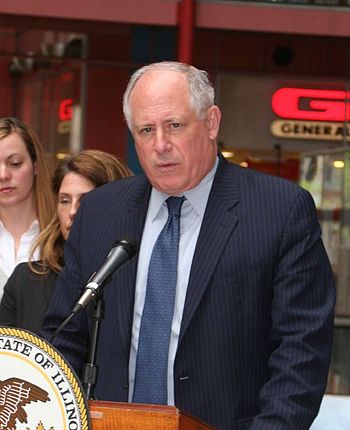Quinn No-Show Proves Sore Loser Label
Quinn’s actions could be compared to the 5-year-old who fails to win at whack-a-mole at Chuck E. Cheese’s, only there’s no pizza around to dry his three-month-old tears.
by Justin Shimko
As Gov. Pat Quinn’s moments running the embattled and cash-strapped state died out, Illinoisans across the Prairie State caught a good glimpse of the kind of person the now-former governor had become. The kind of child-like behavior began on Election Night in November when, despite now-Gov. Bruce Rauner having no practical chance of losing the race for the top job, Quinn refused to concede his defeat. Since then, the outgoing taxer-in-chief spent the remaining days of his political career trying to establish a legacy that didn’t surround directing the state to the worst credit rating in the country and billions of dollars of debt. He took the time trying to rewrite history, telling news outlets willing to listen that he steered the state out of the recession, despite having a higher unemployment rate than the national average and economic growth looking bleak in face of high taxes statewide.

Former Illinois Gov. Pat Quinn (Photo credit: Wikipedia)
Behind closed doors, however, Quinn was building a new legacy. During the final hours of his tenure, Pat Quinn spent his time avoiding any public events surrounding the inauguration of his rival and instead laid “political traps for Rauner on way out the door.” Among the outgoing’s actions were appointments to hundreds of officials to paid and non-paid government positions and executive orders meant to embarrass or force the incoming’s hands. It didn’t take long for Rauner, as the new governor, to rescind some of the executive order and begin the laborious task of rescinding the appointments never approved by the State Senate. These include important appointed positions such as chairman of the Illinois Commerce Committee, the body that approves rate hikes for gas and electric companies. The newly appointed chairman probably didn’t get a chance to even order his business cards before Rauner gave him the necessary boot.
“We have too much evidence that he was not making decisions that were good for the people for the long term,” Rauner said at the first news conference in his second-floor Capitol office since being sworn in a day earlier. “It’s been clear that there has been some inappropriate decisions.”
That’s putting it nicely. Basically, Quinn’s actions since he lost in November have resembled the five-year-old kid who didn’t get enough tickets playing whack-a-mole at Chuck E. Cheese’s, instead whining about the game being unfair. Unfortunately for Quinn, there is no greasy pizza slice able to dry those tears.
In most transitions of government there will be pranks and some cold-shoulders. When the Clinton’s moved out of 1600 Pennsylvania, the staff left the computer keyboards but took the W key, in “honor” of George W. Bush’s new administration. While that did cost some money to clean up, it was only around $14,000, not the potentially millions of dollars in new regulations and higher spending Quinn required through his antics via executive orders and paid appointed positions to his personal friends.
This kind of sore loser mentality is rarely seen in American politics. The worst presidential transition was when Andrew Jackson beat John Quincy Adams. A mob showed up to the White House, forcing Adams to sneak out the back. Adams, like his father before, Andrew Johnson (under the embarrassment of being impeached) and Richard Nixon (who was no longer in office at the time), failed to show up to the inauguration of his successor. Granted, Jackson also failed to place the traditional courtesy call to Adams prior to the inauguration.
Quinn, didn’t call Rauner to concede, either, (though he did call a week after losing to discuss healthcare) nor attend the inauguration of his successor. It is through these actions that we can clearly see Quinn does not know how to bow out gracefully, securing for himself a decent position as the first governor in 15 years to leave Springfield without handcuffs and a legacy similar to that of popular former governor’s Jim Edgar and Jim Thompson.
Instead, he becomes a former politician who will land some cushy advisory board job, lamenting about his days when he was governor and telling anyone who will listen about how he steered the state through the recession and wondering why no one invites him for a fundraiser or to attend a public event.
Maybe someone will buy him a whack-a-mole machine to help pass the time.
Justin Shimko is an award-winning writer and political analyst. He began as a reporter in his college days at the University of Oklahoma, writing for The Oklahoma Daily (rated as one of the best collegiate newspapers in the nation) and The Oklahoman, the statewide newspaper, winning awards from the CSPA and the Society of Professional Journalists. He later moved on to research and writing work for a number of political campaigns. His email is
[email protected]
Latest posts by Justin Shimko (see all)
Related
 Blog Posts
Blog Posts





Quinn No-Show Proves Sore Loser Label
Quinn’s actions could be compared to the 5-year-old who fails to win at whack-a-mole at Chuck E. Cheese’s, only there’s no pizza around to dry his three-month-old tears.
by Justin Shimko
As Gov. Pat Quinn’s moments running the embattled and cash-strapped state died out, Illinoisans across the Prairie State caught a good glimpse of the kind of person the now-former governor had become. The kind of child-like behavior began on Election Night in November when, despite now-Gov. Bruce Rauner having no practical chance of losing the race for the top job, Quinn refused to concede his defeat. Since then, the outgoing taxer-in-chief spent the remaining days of his political career trying to establish a legacy that didn’t surround directing the state to the worst credit rating in the country and billions of dollars of debt. He took the time trying to rewrite history, telling news outlets willing to listen that he steered the state out of the recession, despite having a higher unemployment rate than the national average and economic growth looking bleak in face of high taxes statewide.
Former Illinois Gov. Pat Quinn (Photo credit: Wikipedia)
Behind closed doors, however, Quinn was building a new legacy. During the final hours of his tenure, Pat Quinn spent his time avoiding any public events surrounding the inauguration of his rival and instead laid “political traps for Rauner on way out the door.” Among the outgoing’s actions were appointments to hundreds of officials to paid and non-paid government positions and executive orders meant to embarrass or force the incoming’s hands. It didn’t take long for Rauner, as the new governor, to rescind some of the executive order and begin the laborious task of rescinding the appointments never approved by the State Senate. These include important appointed positions such as chairman of the Illinois Commerce Committee, the body that approves rate hikes for gas and electric companies. The newly appointed chairman probably didn’t get a chance to even order his business cards before Rauner gave him the necessary boot.
“We have too much evidence that he was not making decisions that were good for the people for the long term,” Rauner said at the first news conference in his second-floor Capitol office since being sworn in a day earlier. “It’s been clear that there has been some inappropriate decisions.”
That’s putting it nicely. Basically, Quinn’s actions since he lost in November have resembled the five-year-old kid who didn’t get enough tickets playing whack-a-mole at Chuck E. Cheese’s, instead whining about the game being unfair. Unfortunately for Quinn, there is no greasy pizza slice able to dry those tears.
In most transitions of government there will be pranks and some cold-shoulders. When the Clinton’s moved out of 1600 Pennsylvania, the staff left the computer keyboards but took the W key, in “honor” of George W. Bush’s new administration. While that did cost some money to clean up, it was only around $14,000, not the potentially millions of dollars in new regulations and higher spending Quinn required through his antics via executive orders and paid appointed positions to his personal friends.
This kind of sore loser mentality is rarely seen in American politics. The worst presidential transition was when Andrew Jackson beat John Quincy Adams. A mob showed up to the White House, forcing Adams to sneak out the back. Adams, like his father before, Andrew Johnson (under the embarrassment of being impeached) and Richard Nixon (who was no longer in office at the time), failed to show up to the inauguration of his successor. Granted, Jackson also failed to place the traditional courtesy call to Adams prior to the inauguration.
Quinn, didn’t call Rauner to concede, either, (though he did call a week after losing to discuss healthcare) nor attend the inauguration of his successor. It is through these actions that we can clearly see Quinn does not know how to bow out gracefully, securing for himself a decent position as the first governor in 15 years to leave Springfield without handcuffs and a legacy similar to that of popular former governor’s Jim Edgar and Jim Thompson.
Instead, he becomes a former politician who will land some cushy advisory board job, lamenting about his days when he was governor and telling anyone who will listen about how he steered the state through the recession and wondering why no one invites him for a fundraiser or to attend a public event.
Maybe someone will buy him a whack-a-mole machine to help pass the time.
Justin Shimko
Latest posts by Justin Shimko (see all)
Share this:
Related